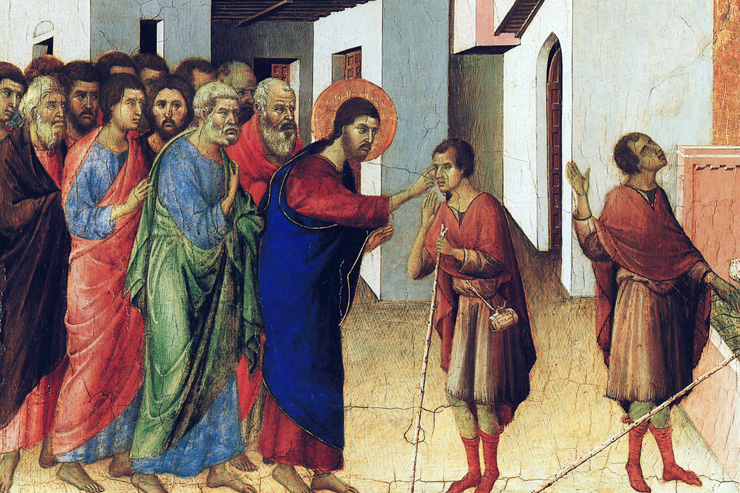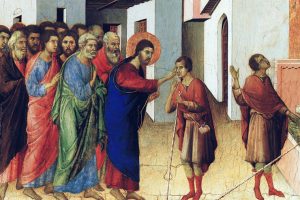4th Sunday of Lent (A)
Just like last week’s gospel of Jesus meeting the Samaritan woman at the well, this week’s gospel gives us a rich and detailed story of a life-changing personal encounter with Christ. The story of the man born blind is full of meaning for our faith, but I just want to touch on one aspect of it: why did Jesus use clay?
It is an interesting question. Think about it. If all Jesus wanted to do was to heal this blind man, He did not need to smear clay on his eyes to do so. The Divine Son of God could have simply willed it and the man would have been healed. Indeed, we see in other places in the gospels Jesus doing just that, even raising people from the dead simply by willing it to happen. So why, then, does our Lord spit on the ground, make clay from his saliva, smear it on this man’s eyes, and then instruct him to wash in the pool of Siloam? Doesn’t it all seem a bit elaborate, when all Jesus had to do was will that the man be able to see?
In our Credo discussions after Mass recently we have been talking about the sacraments. It strikes me that what we see Jesus doing here is very sacramental. Sacraments are visible signs of an invisible reality. The bread and wine used in the Eucharist become the visible signs of Jesus’ Body and Blood, given up for us. The water poured over our heads at baptism is a visible sign that God has cleansed us of our sins. Whether we are talking about confirmation, matrimony, confession or any of the other sacraments, they all work in this way. They are all visible signs of grace given by God.
Jesus Himself is the fundamental sacrament. What is the Incarnation but the invisible reality of God made visible to us in human flesh? The Church can also be considered a sacrament, as she is the visible sign of Christ’s redeeming mission continuing in space and time.
In all of these examples of sacrament, we can ask the same question as we asked about Jesus healing the blind man with clay. Why? Could not God have accomplished all of these things in a way that was less involved, less elaborate? In a way that was less physical? In a way that was less messy?
Yes, He could. Yet God chose to come to us in ways that we can see and touch and He did so for our benefit.
We are creatures of both body and spirit. When we think of religious things, we tend to focus almost exclusively on spiritual realities. This is understandable. God is spirit. Grace and mercy, sin and forgiveness are all spiritual things. But we are not only spirit. God made us as bodily creatures, and as bodily creatures, we experience the world through our senses. We gain information through our sight, hearing, and by our sense of touch, taste and smell. This is how we learn. God made us this way, and so it only follows that He would come to us in ways that we can understand; ways that we can see, touch, taste, hear and smell. This doesn’t mean that God does not also come to us in spiritual ways, but rather the spiritual ways that God touches our lives will be indicated through physical signs.
God comes to us in ways that we can physically sense for our benefit. Fr. Leo Trese, in his book, The Faith Explained, shares these thoughts about administering the sacrament of baptism.
I am sure that I have poured the water of baptism on the heads of many adults whose souls were in the state of sanctifying grace. They had already made acts of perfect love for God; they had already received the baptism of desire. And yet in every such case, the convert has expressed his relief and joy at receiving, actually, the sacrament of Baptism. Because, up to that moment he could not be sure that his sins were gone. No matter how hard he might try to make an act of perfect love, he never could be sure that he had succeeded. But when the saving water had flowed upon his head, he knew then with certainty that God had come to him.
The feel of the cool water flowing over his head made the reality of God’s forgiveness present to this man’s senses. Likewise the taste of the Eucharist signals to our mind that we are consuming the Body and Blood of Christ. The sound of the priest’s voice saying, “I absolve you of your sins,” brings the joy of God’s mercy to our ears. God doesn’t need the sacraments. We do. The sacraments are made by God for our benefit, so that we might know He has truly come to us.
God desires greatly to be with us; every part of us. That means in body as well as in spirit. This is why God will restore to us glorified bodies after the resurrection. This is why God desires to dwell within our bodies when we receive the Eucharist even now in this life. Remember that this same God Himself took on a body in the Incarnation. He was born of a woman, and nursed at her breasts. Christianity is founded upon the belief that God has come to us in physical form. It is a sacramental faith.
The way that Jesus chose to heal the man born blind, is a foreshadowing of the sacraments. Just like the Church uses water, oil, bread and wine, Jesus uses spit and dirt to form clay. Just like we have sacramental liturgies, Jesus instructs the man to perform a ritual action by washing in the pool. Why?
For two reasons. The first is that this man needed it. He needed to feel the warmth and firmness of Jesus’ hands on his blind eyes. He needed to hear our Savior’s words, telling him to go and wash. He needed to go through the actions of the ritual, feeling the cool water cleansing his face. Jesus healed him in this way for his benefit, so that he might know God’s healing presence.
The second reason is because we need it, too. Jesus tells us at the beginning of this gospel reading exactly why He was healing this man: so that the works of God might be made visible through him (Jn 9:3). The works of God made visible – that sounds like a good definition of a sacrament to me.
May each of us who participate in the sacramental life of the Church live the graces given in those sacraments in such a way that we, too, may become sacraments, making God’s glory visible through our lives.


